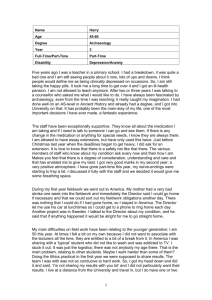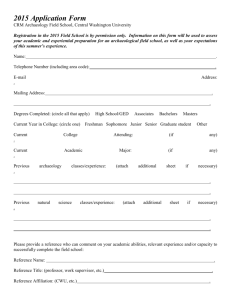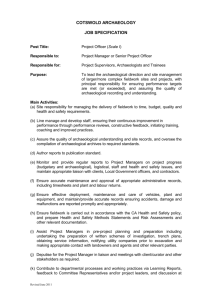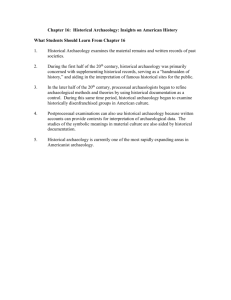Department of Archaeology and Prehistory,
advertisement
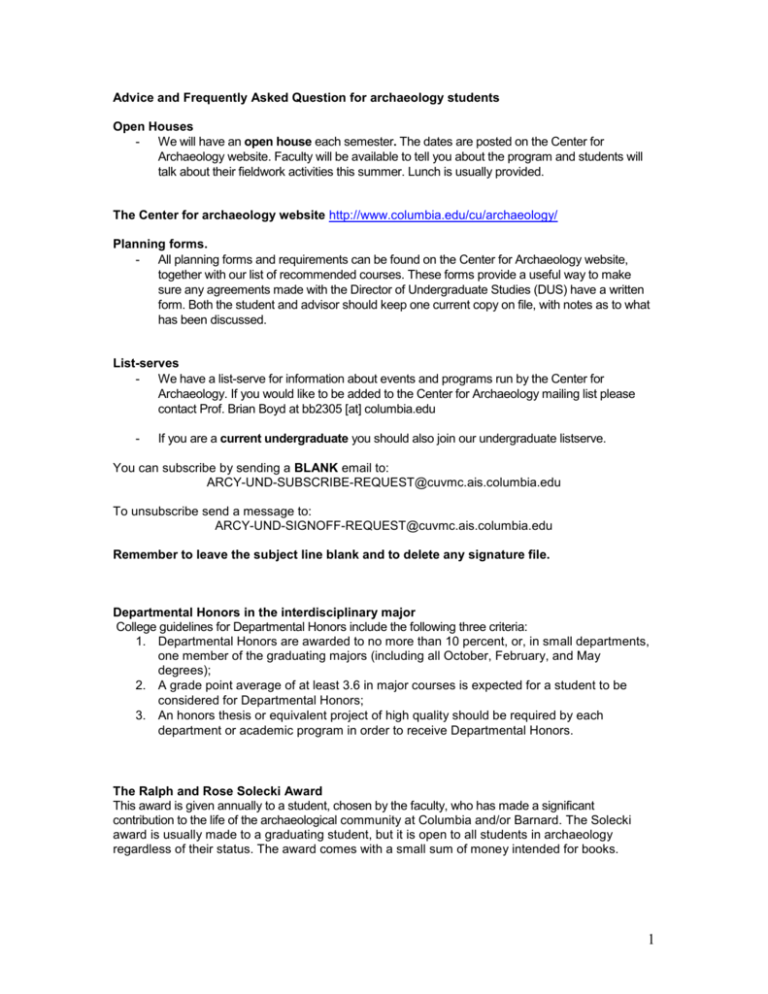
Advice and Frequently Asked Question for archaeology students Open Houses - We will have an open house each semester. The dates are posted on the Center for Archaeology website. Faculty will be available to tell you about the program and students will talk about their fieldwork activities this summer. Lunch is usually provided. The Center for archaeology website http://www.columbia.edu/cu/archaeology/ Planning forms. - All planning forms and requirements can be found on the Center for Archaeology website, together with our list of recommended courses. These forms provide a useful way to make sure any agreements made with the Director of Undergraduate Studies (DUS) have a written form. Both the student and advisor should keep one current copy on file, with notes as to what has been discussed. List-serves - We have a list-serve for information about events and programs run by the Center for Archaeology. If you would like to be added to the Center for Archaeology mailing list please contact Prof. Brian Boyd at bb2305 [at] columbia.edu - If you are a current undergraduate you should also join our undergraduate listserve. You can subscribe by sending a BLANK email to: ARCY-UND-SUBSCRIBE-REQUEST@cuvmc.ais.columbia.edu To unsubscribe send a message to: ARCY-UND-SIGNOFF-REQUEST@cuvmc.ais.columbia.edu Remember to leave the subject line blank and to delete any signature file. Departmental Honors in the interdisciplinary major College guidelines for Departmental Honors include the following three criteria: 1. Departmental Honors are awarded to no more than 10 percent, or, in small departments, one member of the graduating majors (including all October, February, and May degrees); 2. A grade point average of at least 3.6 in major courses is expected for a student to be considered for Departmental Honors; 3. An honors thesis or equivalent project of high quality should be required by each department or academic program in order to receive Departmental Honors. The Ralph and Rose Solecki Award This award is given annually to a student, chosen by the faculty, who has made a significant contribution to the life of the archaeological community at Columbia and/or Barnard. The Solecki award is usually made to a graduating student, but it is open to all students in archaeology regardless of their status. The award comes with a small sum of money intended for books. 1 Frequently asked questions What classes do you recommend for someone interested in an Archaeology Major or Concentration? - We post a list of recommended classes for the major each semester. It can be found on the Center for Archaeology website - The core required introductory classes, offered annually, are the following. They are a good place to start - ANTH V1007 Origins of Human Society (Fall) - ANTH V1008 The Rise of Civilization (Spring) - ACLG V2028 Introduction to 21st Century Archaeology (Spring) Which major or concentration should I sign up for? There are two ways to study archaeology. You may be unsure as to which major to take, since there are options tailored to particular interests. You usually won’t need to declare until you have taken some archaeology classes. By that point it usually starts to become clear which option will work best for you. Here are the options: 1. The Interdisciplinary Major and Concentration: this is a coordinated program that most often crosses over between Anthropology and Art History & Archaeology, but also draws students with an interest in Classics, History, EALAC and MEALAC. The core goal of this program is to provide students with the range of disciplinary approaches to the study of the human past through its material residues. This program is good for those who are interested in the archaeology of the classical world, those who would like to explore the range of disciplinary orientations to archaeology, and those who would like to take classes that focus on different regions of the world. 2. Archaeology track within Anthropology (Major or Concentration): a student in this program takes a core set of courses in archaeology, while maintaining an anthropological focus to your study. Your degree will be in Anthropology This major is good for students who are interested in one particular region of the world and want to learn more about it, also for those interested in anthropological theory particularly as it applies to archaeology, and for those who want to apply to an anthropology program in grad school. You will able take more classes in socio-cultural anthropology as part of this major. What are the requirements for the senior thesis? - The senior thesis is optional for the Interdisciplinary Major in Archaeology - It should be original research, analysis, or commentary and will be read by a committee of two faculty members. - If you want to write a thesis you should find a faculty advisor to work with and sign up for senior thesis advising with him or her. - You will be registering for ‘individual directed research’, for 3 credits per semester over two semesters (6 credits total). In Anthropology the course code is is 3997-3998, in Art History AHIS 3997-98 - No thesis proposal is required - The thesis is normally around 50 pages in length and is due to be submitted by 25th March of your final year. A draft should be turned in at least one month before this date. Is there any funding available for fieldwork/thesis research? - General Studies offers $250 for GS seniors working on a senior thesis or honors project. - Columbia College also offer funding towards senior thesis research 2 - - The Anthropology Department awards money from the Stigler fund towards fieldwork. These funds are awarded competitively. Applications can be downloaded from the Center for Archaeology website. If you receive Stigler funds for fieldwork, the money cannot usually be used for tuition or fieldschool expenses. The Archaeological Institute of America also offers a range of scholarships towards fieldwork experience. Details can be found on their website. How do I find a field project for the summer? Notices about fieldschools are often circulated throughout the year, so keep an eye on your email and the noticeboards. Check the Center for Archaeology website for a list of projects that are affiliated with Columbia. You can also look at the listings on the Archaeological Institute of America website at http://www.archaeological.org/fieldwork and www.ilovethepast.com for projects in the UK and Ireland and elsewhere. Once you have found a project that you like the look of you should contact them to see if they have space, and to find out the requirements and the costs involved. Then make an appointment to speak with the Director of Undergraduate Studies about your proposed program to ensure that you can receive credit for it. How do I carry out fieldwork for course credit? (if not an accredited field school that Columbia recognizes) - Students need pre-approval from DUS - Although up to 8 points are allowed towards the degree, the DUS will approve for up to 6 credits only. For more than 6 credits students will need permission from the dean - Students need to provide syllabi (preferably before the course) - They need to submit their transcript after the course - The DUS will retain a record of what the college will accept transfer credit for How does Amheida study abroad count towards my degree? - In contrast to non-accredited field schools, all 16 points from Amheida field school can count towards the degree. The Amheida study abroad program also fulfils the fieldwork and lab requirements of the major. Can my fieldwork count towards the lab requirement? - We will allow fieldwork to fulfil the lab requirement if students can show that this was a component of their fieldwork. You will need to discuss this with the DUS or graduate student advisor. Can I complete my fieldwork requirement by attending this dig/project? - Some students want to carry out fieldwork on research projects rather than on field schools. In this case they should talk to the DUS about taking an independent study with a faculty member when they return in order to get course credit. Written work is required as a consequence of the field participation, usually a critical diary kept while on the fieldwork project, along with a paper that critically assesses your experiences of fieldwork and/or the material that you excavated. Does this particular class count toward the interdisciplinary major? It can count directly towards the major if it has some archaeological component – this includes the following: - Any class that deals with material culture with an orientation towards the past. This could be architecture, monuments, landscape as well as material that has been excavated or collected during survey. It can also include the recent past, as long as the orientation is material in outlook. - Any class that reads archaeological theory - Classes on the history of human evolution or on human skeletal biology I have a museum internship. Can I get course credit for it? 3 - If you have a museum internship you can be awarded 3 credits for 120 hours over the semester. You will be expected to keep a journal and will need to sign up with a faculty advisor for a program of independent study. This will include writing a short paper, and carrying out relevant reading. What counts as a ‘related class’? A class can count as related if the student can make a case that it is relevant to his or her course of study. Classes that count as related rather than as part of the major include examples such as the following: - Classics or history classes that deal only with textual analysis and do not incorporate any study of material objects. - Geology classes that have no connection with the human past - Palaeontology - Classes on primates, ecology etc - Language classes N.B. Be careful as to which courses you hope to count for distribution. Unless a course is required for both programs in which you are enrolled, you will not be able to ‘double count’ a course for credit. This means that you can’t count a course for the Major in Archaeology and as part of another concentration, major, or the Core Curriculum, unless it is required for both programs. Always review your program in advance with the DUS or graduate student advisor to ensure that you do not run across potential problems such as these! 4
